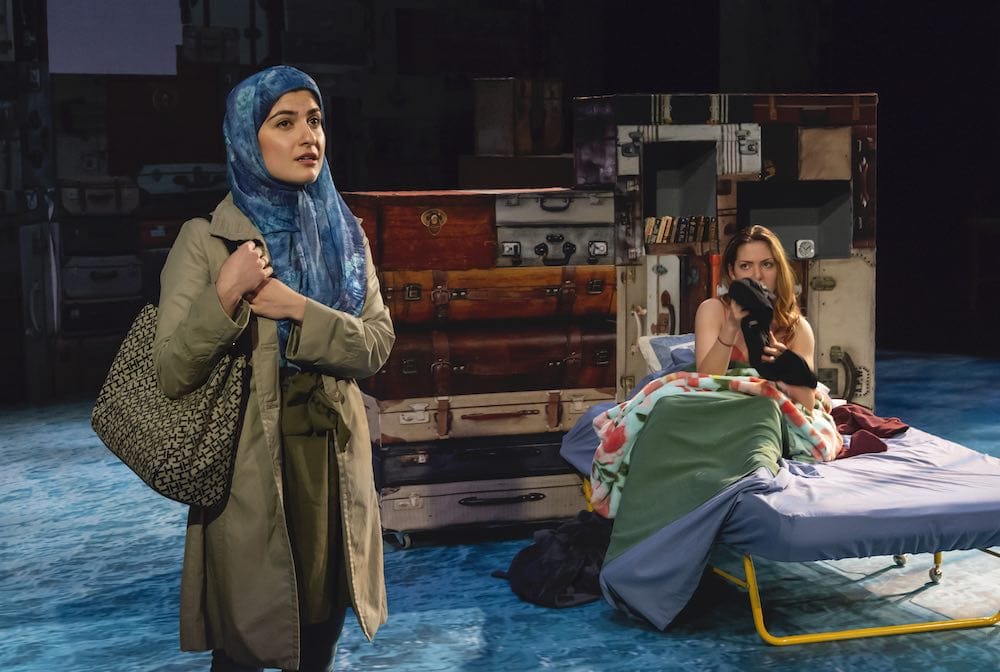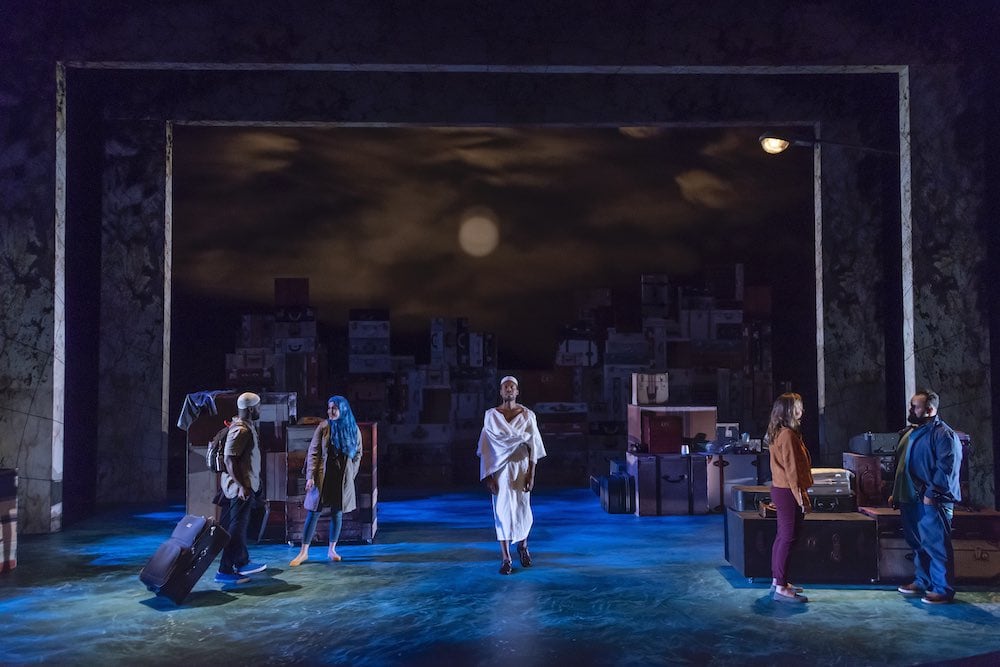Pilgrims Musa and Sheri in the New World—the award-winning play now enjoying its DC debut at Mosaic Theater—is as delicious a romp as any that’s come along in a while.

Billed as a romantic comedy, Pilgrims is wickedly funny with touches of farce, sweet but not saccharine, sad but not tragic. In fact, loss is part of the equation in this bittersweet tale of triumph over the odds.
And triumph it does. All the characters rise above the pigeonholes in which society has tried to place them. Like earlier generations of immigrants, the newcomers in this group—all of whom happen to be Muslim—learn that it takes chutzpah to survive.
The premise is simple. Musa, an Egyptian taxi driver, picks up Sheri, an American waitress, outside the diner where she works. It’s 2 am. Both are lonely and vulnerable—he because he is inexperienced, and she because her experiences have all ended badly—so they hook up and head for his apartment. It’s a barely furnished space up several flights of stairs.
Following a few twists and turns, one involving a lightbulb, they fall in love.
Of course, there are obstacles. One is Musa’s roommate, named Abdallah, who is off on a pilgrimage to Mecca. The only trace of him in the room is a rolled-up mattress on the floor.
Another is Musa’s friend and occasional employer, Tayyib, who warns of the danger of fooling around, and preaches the importance of marrying a good Muslim woman.
The third—you guessed it—is the good Muslim woman. She is Gamila, the daughter of immigrants, educated in America but pious and chaste, to whom Musa is engaged. In fact, she is off in Egypt, meeting Musa’s parents and planning the wedding, while all this is going on.

There are some dazzling performances in Pilgrims, all executed with perfect timing. One of the funniest of these is the scene in which Gamila, played with utter propriety by Sanam Laila Hashemi, returns unexpectedly, and finds a naked woman (an ebullient Rachel Felstein) in her fiancé’s bed.
The two women engage in a verbal duel in which Sheri, pulling on her underwear, tries to explain, while Gamila, oozing contempt, responds with poisonous disdain.
More rapturous, but just as comic, are the scenes between Sheri and Musa (played with joyous innocent naughtiness by Ahmad Kamal) as they circle around each other in a kind of antic foreplay, and ultimately fight in what may be the sexiest lovers’ quarrel in history.
Tayyib (Gerrad Alex Taylor) is a cheerful crook, as devious as he is funny, arguing that he can’t pay Musa in cash since that would destroy their friendship. He is also the upholder of tradition.
Abdallah, the missing roommate, is the only character who doesn’t tell jokes. Played by Freddie Lee Bennett with stirring religiosity, he is, in a way, the ghost of tradition. He floats through the comedy, profoundly grateful for the success he has found in America. He also radiates loss.
The sense of loss—especially for those who are caught between old and new—is beautifully evoked in Nephelie Andonyadis’ set. Stacks of suitcases, some real and some not, litter the stage, casting long shadows before a backdrop of a night sky filled with a full moon.
In an ingenious touch, one of the stacks of baggage is turned around, revealing a narrow bed.
Overhead, a bare lightbulb casts a hideous glow.
Brittany Shemuga is the lighting designer who transforms the scene from a baggage claim at an airport to Musa’s shabby apartment.
The sound is courtesy of Roc Lee, who concocts a cacophony of noise, including the battling neighbors upstairs, the traffic outside and the footsteps in the hall. Michelle Elwyn is the source of the props—paperbacks with lurid covers, gaudy bedcovers and an awful lampshade.
Danielle Preston is the costume designer, responsible for Sheri’s thong bikini and her mismatched bra—bought on sale, she explains—as well as Gamila’s modest but elegant outfit, topped by a perfectly tied hijab. Most astonishing, however, is Abdallah’s torn white robe, whose meaning we only gradually come to understand.

Pilgrims, for all its humor, is about loss. It’s about the tension between wanting to be free of the limitations of a rule-bound society, yet simultaneously hanging on to the rules because of the safety they offer. It is the contradiction that haunts every immigrant experience.
The play asks, ‘Do you cling to safety—by carrying all the baggage with you—or do you muster up the chutzpah and charge ahead?’
There are no easy answers, which is partly why the play was chosen for this year’s Voices from a Changing Middle East Festival. The festival, which is now a highlight of Mosaic’s seasonal programming, was begun 20 years ago when Ari Roth, Mosaic’s Founding Director, was head of Theater J.
Much of the credit for this briskly-paced production goes to Shirley Serotsky, its director. A mainstay of Theater J for nine years, she was head of many productions there, including several seasons of Voices. She is now Associate Artistic Director at the Hangar Theatre in Ithaca, NY.
In Pilgrims, according to Serotsky, Musa reminds Sheri of her own great-grandparents, who emigrated from Europe and had plenty of chutzpah.
“We do not like everything that Musa and Sheri do,” Serotsky adds, “but we understand them.”
The universality of immigration is a favorite theme of Yussef El Guindi, the award-winning playwright who wrote Pilgrims roughly a decade ago. Born in Egypt, brought up in London and now a resident of Seattle, he is the author of approximately 20 works for the stage.
Pilgrims, which was first produced in Seattle in 2011, won the Steinberg/American Theatre Critics Association Award for Best New Play Outside New York. El Guindi himself was named top emerging playwright two years earlier by the same group.
Despite its surface sweetness—or perhaps because of it—Pilgrims is a beautifully-wrought play, one that’s funny and full of surprises.
It’s a paean to immigration, reminding us that newcomers, struggling to make it here, are not “aliens” or “refugees” but ordinary people, looking for a better life. And willing, in most cases, to take the risks that are needed to find it.
Running Time: Two hours and 10 minutes, including one intermission.
Pilgrims Musa and Sheri in the New World plays through February 16, 2020, at the Mosaic Theater, located inside the Atlas Performing Arts Center, 1333 H Street NE, Washington DC. For tickets, call (202) 399-7993, extension 2 or go online.




